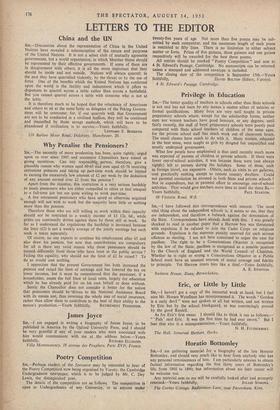have followed this correspondence with interest. The most vital thing
about the independent schools is, it seems to me, that they are independent, and therefore a bulwark against the domination of the State. Correspondents have already dealt with this. I was greatly shocked to read in another paper that a Harrow boy was threatened with expulsion if he refused to join the Cadet Corps on religious grounds. Expulsion is the supreme penalty reserved for such serious offences as stealing. I am not here concerned to argue the case for pacifism. The right to be a Conscientious Objector is recognised by the law of the State: pacifism is recognised as a tenable position by the Church of England and the World Council of Churches. Whether he is right or wrong a Conscientious Objector in a Public School must have an unusual amount of moral courage and fidelity to principle. Yet Harrow treats him like a thief.—Yours faithfully, A. E. SWINTON. Swinton House, Duns, Berwickshire.


































 Previous page
Previous page